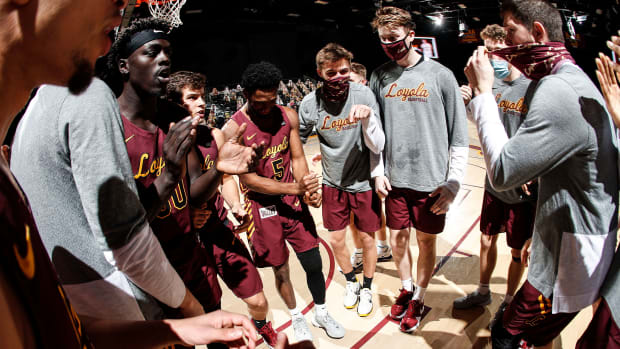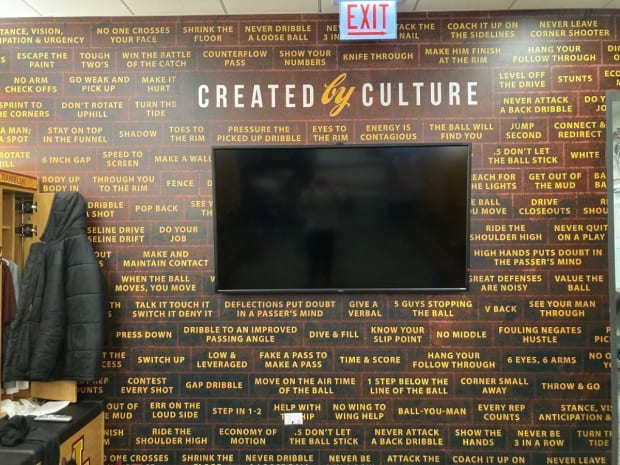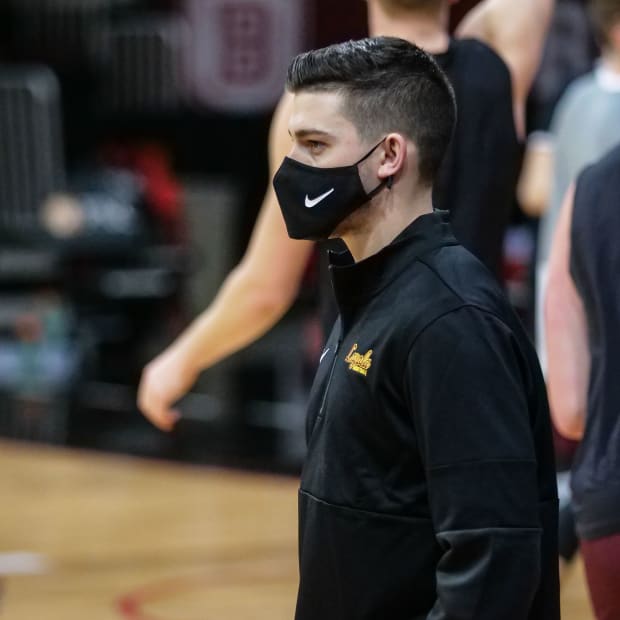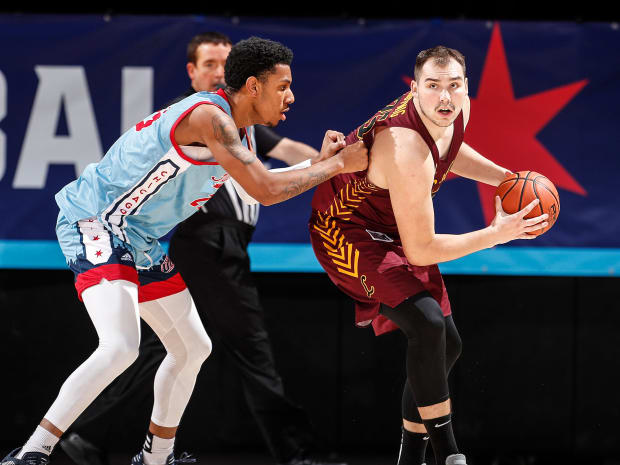Three years after their magical Final Four run, the Ramblers are out to prove that this year's team is even better.
A debate question you’d expect to see on Twitter or a fan message board found its way into the Loyola Chicago men’s basketball offices recently.
Best-of-seven series: Final Four team vs. this year’s team. Who wins?
Clayton Custer has a unique perspective on the topic. Three years ago, at this time, Custer was putting the finishing touches on a Missouri Valley Player of the Year campaign, unaware of how much his life would change in the next six weeks.
As the starting point guard, Custer helped lead Loyola on an unthinkable run to the Final Four that made him and his teammates budding celebrities on the shores of Lake Michigan. Now, Custer wears a polo shirt and slacks on game days, getting his start in coaching as the Director of Player Development for the same program he once starred at. What’s his take?
“This year’s team has a higher upside,” Custer says. “I don’t want to make any of my teammates mad from a couple of years ago, but I think the team this year has an incredible upside.”

Senior guard Lucas Williamson is even more confident. Williamson, who played 20 or more minutes in all five NCAA tournament games as a freshman, chuckled when the topic was first broached.
“This team would beat the Final Four team for sure,” Williamson says.
Three years after Loyola Chicago introduced itself to the college basketball world with a run for the ages, the Ramblers have built another team capable of taking March by storm. The numbers back up what Williamson and Custer believe: This year’s Ramblers are even better than the Final Four iteration.
Through 20 games in 2017–18, Loyola was 16–4. This season, it is 17–3. The Final Four team spent most of February ranked in the mid-50s in KenPom’s efficiency rankings and finished the year ranked No. 31, even after the run to the Final Four. This year’s team is in the top 15 nationally in both KenPom and the NCAA’s NET ranking system. This week’s AP poll featured the Ramblers at No. 22, their first time ranked since 1985. The 2020–21 Ramblers are more efficient on both offense and defense, rebound better and win the turnover battle by more than the team that redefined what success looks like at Loyola.
How have the Ramblers ensured that the Final Four run wasn’t a fluke? Two words: culture and continuity. The warm-up shirts the Ramblers wore throughout their Final Four run in 2018 featured the words Created by Culture across the front, and that phrase perfectly describes the importance of this program’s culture to its growth. It takes more than just recruiting talented players to go from a 1–17 record in the Horizon League 10 years ago to a Final Four and perennial contention at the top of the Missouri Valley.
Culture is on the walls of the Loyola program ... literally. One wall of the team’s locker room is known as the “culture wall” and has dozens of phrases that embody the program written on it.

“You see basketball in a different way when you have a culture like this,” senior big man Cameron Krutwig says. “You can never watch basketball the same because you see all this stuff just racing through your mind.”
One way the culture gets stronger is by having players grow up inside the program. Williamson and Krutwig played on the Final Four team, and a third starter, Aher Uguak, was on the roster redshirting as a transfer from New Mexico. Williamson says he has “mastered the culture” and has now moved to passing it down to the young players on the Loyola roster.
“Culture carryover is all about the upperclassmen. It’s what you want in a program, and that’s how you sustain it. When the Final Four seniors were freshmen, they were part of a CBI championship team,” Loyola coach Porter Moser recently told SI’s Pat Forde. “Now we have seniors Cameron Krutwig and Lucas Williamson, who were freshmen on the Final Four team, and they’re protecting that culture. That’s what’s fun as a coach, is seeing the older players fighting to protect that culture.”
Perhaps equally important to the program’s sustained success has been continuity on staff. Assistant coach Bryan Mullins left after the 2018–19 season to be the head coach at SIU, but Moser rebuffed reported interest from St. John’s that spring to stay in Chicago. Assistant coaches Drew Valentine and Matt Gordon have been with the program since the Final Four season.
“It’s great because those guys know what’s expected,” Krutwig says. “When everyone’s on the same page you can really get creative.”
Meanwhile, both Custer and Director of Basketball Operations London Dokubo played for Moser at Loyola and now hold support staff positions. Custer played professionally in Poland for four months after graduation, then returned to Chicago and worked in the business world for eight months. But he couldn’t shake the itch to get back in the gym, so he called Moser and asked for an opportunity to get started in coaching.
“You know your culture is good when you have former players wanting to come back and be assistants,” Moser says.

One defining tenet of that culture: not caring who gets the credit. Moser points out that the Ramblers have just one player (Krutwig) who averages double-figure scoring.
“There’s not one guy upset about his numbers on our team,” Moser says.
That selflessness was also a defining characteristic of the Final Four team. A different player led the Ramblers in scoring in each game of their run through the NCAA tournament.
“It's really difficult to get a group of guys that play basketball to be about something bigger than yourself,” Williamson said of the 2017–18 team. “We wanted to win for the sake of the team, but you also wanted to win because you wanted your brothers to experience that winning with you. That’s something I’ll never forget.”
The senior class of this year’s team represents the final remaining players from that group. They also represent a group that believed in Moser and his vision for Loyola before the program took off. They joined a team that hadn’t finished above .500 in conference play in 10 years and hadn’t made the NCAA tournament in 30 years. The year before they arrived, the Ramblers were last in the MVC in attendance by far, and were largely irrelevant in the Chicago sports scene. Regardless, they believed.
“During the recruiting process I remember being up in [Moser’s] office and him saying, ‘we’re just a big man away from really taking this thing off the ground and getting rolling and we think you can come in and help us right away,’ ” Krutwig recalls. “He couldn’t have been more right.”

After starting for the Ramblers as a freshman and leading them in scoring in the Final Four game against Michigan, Krutwig has blossomed into one of the most accomplished players in MVC history. He’s one of just four players in conference history to tally at least 1,500 points, 800 rebounds and 300 assists in his career. The others? Larry Bird, Oscar Robertson and Hersey Hawkins.
Regardless of what happens come March, Krutwig and this class’s ability to not only sustain but also build on the legacy of the Final Four team make them one of the great stories in the sport. The culture and continuity that Loyola have maintained are why the program hasn’t faded from college basketball’s consciousness. Programs like George Mason, Davidson and Florida Gulf Coast will always be remembered for one incredible March. The Ramblers are on the path to transcend that.
And the final chapter still hasn’t been written.